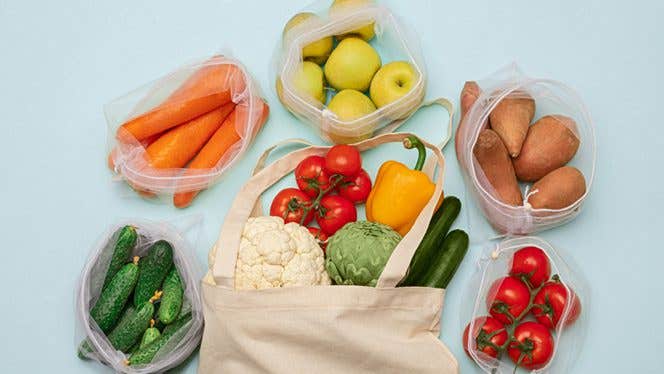
Vegan Diet Significantly Better for the Environment than Mediterranean Diet: New Research
Following an entirely vegan diet may be significantly better for the environment than the Mediterranean diet, according to new research published in the International Journal of Environmental Research and Public Health. The study also indicated positive outcomes related to weight loss, insulin sensitivity, and cholesterol levels for those eating vegan.
A vegan diet eschews all animal products. Mediterranean diets, meanwhile, exclude all red meat and are largely plant-based but include some fish, chicken, and dairy. For this study, Italy-based researchers compared the environmental footprints of the two diets using a life cycle assessment—an analysis of the environmental impacts of products during their entire life cycle. They found that although animal products only make up about 10% of the average Mediterranean diet, their inclusion makes the diet significantly less environmentally friendly than it would be without any animal products: By the researchers' calculations, vegan diets produce 44% less environmental impact. The assessment was based on a theoretical 2,000-calorie diet.
“Despite the low content of animal foods, the Mediterranean diet has shown a total environmental impact higher than that of the vegan diet,” says Luciana Baroni, MD, one of the study’s authors. “The diet of each person is important because it represents the most powerful single action to affect the health of the environment. We won't get very far as a species if the environment poisons us, makes us sick, and doesn't provide us with the resources to survive. Unfortunately, people don't know this, because they only hear recommendations,at most, to reduce meat consumption to combat climate change.”
Eating Healthfully to Protect the Planet
A growing body of research underlines how cutting meat and dairy products can help better protect the planet from climate change and pollution. Another 2023 study, published in The American Journal of Clinical Nutrition, concluded that vegan diets are the least environmentally damaging diet.
The study found that vegan diets generate 0.7 kg of carbon dioxide per 1,000 calories consumed whereas a meat-heavy diet, such as keto, generates 3 kg of carbon per 1,000 calories. Additionally, a study published in The Lancet Planetary Health in 2022 found that healthier foods such as plants, grains, fruits, and vegetables offer the lowest environmental impact, signifying a correlating relationship between foods that are good for human health and good for the planet.
By contrast, diets primarily featuring animal products, especially beef, present significant threats to the environment. Animal products require 83% of the planet’s farmland, despite only producing 18% of the world’s calories. Overall, research indicates that animal products, even in low-meat diets such as in the Mediterranean, produce notable environmental consequences, such as wasted energy and excessive methane emissions.
“Research agrees that the consumption of animal foods is the main determinant of the environmental impact of a diet,” Baroni says. “Switching to a vegan diet is not only the most powerful action any of us can do for the planet but also the cheapest and the easiest.”
To learn more about a whole-food, plant-based diet, visit our Plant-Based Primer. For meal-planning support, check out Forks Meal Planner, FOK’s easy weekly meal-planning tool to keep you on a healthy plant-based path.
About the Author

About the Author
Maxwell Rabb
Join our mailing list
Get free recipes and the latest info on living a happy, healthy plant-based lifestyle.
By providing your email address, you consent to receive newsletter emails from Forks Over Knives. We value your privacy and will keep your email address safe. You may unsubscribe from our emails at any time.
